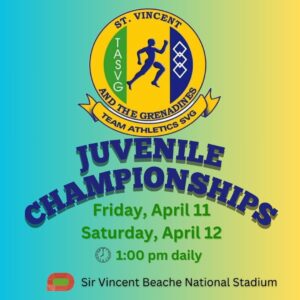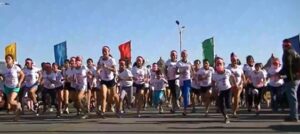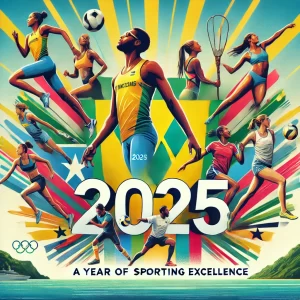Sport and Good Causes
The recent announcement by this country’s Prime Minister that the National Lotteries Authority (NLA) has been giving assistance to persons facing challenges in health and education, may well have come as a shock to many Vincentians, since it is perhaps the first time since the establishment of the institution that such a pronouncement has been made.
For decades, since its establishment, Vincentians have been told that the national lottery served two main causes, sports and culture.
For many decades, too, Vincentians, especially those engaged in sports and culture, have been asking for some form of accountability in respect of the annual contributions made by the NLA to the aforementioned causes. Unfortunately, it is a major challenge to get responses to appeal for accountability.
When, in 2015, it was announced that the NLA borrowed $6.5m from the National Insurance Services, to assist with the provision and/or upgrading of sport infrastructure in the country, many grew concerned. The cause for concern was that at the time of the announcement of the loan, the entire nation was aware that general elections were pending. Additionally, it was and remains difficult to understand why the NLA, itself a money-making institution, would have wanted to borrow money from, of all national entities, the National Insurance Services.
The NLA has, in the recent past, taken on board the responsibility to develop and maintain sporting facilities in different parts of the nation, without any ‘rhyme or reason’. The facilities so established seem to be better constructed and maintained, and several include lighting to facilitate evening sporting activities. The end result is that we now seem to have on the one hand, the National Sports Council (NSC), which, under the National Sports Council Act, has a mandate to develop and maintain sports infrastructure in St Vincent and the Grenadines, itself heavily reliant on the NLA for fulfilling its mandate, and the NLA, doing essentially the same thing relative to sports infrastructure. The only difference is that the NLA can afford to construct and maintain all of the facilities so created but the NSC is in a constant struggle to adequately effect its mandate.
The foregoing does not seem to make sense, except, perhaps, in the broader political context. It certainly does nothing for the establishment of a professional administrative sport structure in St Vincent and the Grenadines.
Good causes
In every society, it is possible to identify what can readily be called, good causes. These are usually activities that are designed to redound to the benefit of whole or aspects of societies.
The Collins Dictionary states, “If you say that something is for a good cause, you mean that it is worth doing or giving to because it will help other people, for example by raising money for charity”.
In the USA, for example, Georgia established a lottery with the sole intention of providing scholarships for members of the community to further their education.
Institutions such as the Leo, Lions’ and Rotary Clubs espouse good causes such as raising funds for medical treatment for the less fortunate in societies.
In St Vincent and the Grenadines, each week we can find several institutions being mentioned on the media as having found it necessary to make contributions to individuals and institutions in need, whether it be for health, education or specialised issues. People and agencies contribute to schools in need of such critical features as libraries, science laboratories, sport equipment, to name a few.
Sport and good causes
Over the years we have witnessed significant growth in sport and the power of sport.
Nelson Mandela is credited with singing the praises of sport when fully immersed in the struggle to get South African Rugby to be open to social inclusion in the aftermath of the demise of the brutish apartheid system.
While addressing the inaugural Laureus World Sports Awards in 2000, Nelson Mandela, made the historic announcement, “Sport has the power to change the world. It has the power to inspire. It has the power to unite people in a way that little else does.”
Mandela’s words have been repeated all across the world and remains a beacon to sporting organisations at different levels.
Increasingly, sporting organisations have begun to understand that they do not operate in a vacuum. They function within societies and at once are impacted by and impact those societies. As social institutions, sporting organisations cannot escape the social realities that exist and impact all that happens around them. Acknowledgement of this fact has come at great price to individual athletes and sporting institutions.
Mohammed Ali stood up against the racism and for civil rights. A University of Louisville document states, “In an age of Jim Crow laws and brutal lynchings, for a young Black man to stand up and proclaim his greatness, defy convention, refuse to be humble or to know his place, was an incomparable act of bravery and defiance.”
Ali is quoted as saying, “When you saw me in the boxing ring fighting, it wasn’t just so I could beat my opponent. My fighting had a purpose. I had to be successful in order to get people to listen to the things I had to say. . . . I wanted to be a champion who was accessible to everyone. I hoped to inspire others to take control of their lives and to live with pride and self-determination.” For Ali there was a greater cause for which he gave so much of his sporting talent.
US athletes, Tommie Smith and John Carlos, together with Australian, Peter Norman, identified with the case for human rights in their respective countries while on the podium at the Summer Olympics in Mexico City, Mexico, in 1968. Four years later, Vince Matthews and Wayne Collett, both Americans, took their stance for justice at the Olympics in Munich, Germany.
In the NFO in the US, Colin Kapernick took the knee during the playing of the national anthem in support of human rights abuses in his country.
More recently, during a FIFA World Cup game in Qatar a few weeks ago, the entire German team covered their mouths in protest against human rights abuses in the Gulf State.
For several years now the International Olympic Committee (IOC) has played a leading role in facilitating the athletes who are refugees, with no country, as a result of circumstances outside of their control, so that they could continue to enjoy their sporting ambitions.
The war in Ukraine has led many international sporting bodies and athletes to lend their support to the plight of the people of that European country in a manner never before seen in the history of the world.
There is no shortage of good causes in today’s world. Everywhere there are issues that cry out for the attention and vocal support as well as other supportive ventures, of the sporting community.
Gone are the days when it was felt that those involved in sport must ignore the numerous malicious and brutal abuses being visited in one’s fellow men, wherever in the world these take place.
Many of those in sport who have dared to stand up against oppression and discrimination of any sort, have found themselves alienated from the very sport that they once enjoyed. This has not prevented others in sport from coming forward in a continuous process of protest against human rights abuses, in sport or in society at large, wherever that may be.
Sport produces its own heroes, many of whom often have to be reminded that they have an important role to play as influencers of human behaviour around the world.
There is a growing understanding that if athletes and sporting organisations chose to remain silent in the face of human tragedies created by man’s inhumanity to man in different forms, different places and times, on whose shoulders would the responsibility to do so, fall?
While Mahatma Gandhi, Martin Luther King Jr and Nelson Mandela were not sportsmen, they all served as inspirations to those who donned the sports arena, through the ages.
Kapernick may never play professional American Football ever again, but he has become synonymous with the struggle of sportsmen and sportswomen and their willingness to make life-threatening sacrifices for ‘a greater cause’.
We are all products of the societies into which we are born and socialised. But we are as capable of changing human behaviour through use of the very talents we developed in those same social environments. We do not all have to sit in a corner and cower in fear at what our protestations can cause to be wrought upon us.
Christians have to live with the knowledge and belief that Christ was strung up on a cross for seeking to save humanity from itself. To the average Christian, their commitment to a life in Christ leaves them likely candidates for the same of worse lot in their personal lives. But they too are committed to a greater cause.
In Vincentian society today, sporting organisations and athletes must seek out good causes and lend their full support. To remain silent is to be cowardly.
We must commit to the fight against climate change.
We must commit to gender equity in society.
We must commit to an end to a form of political patronage that ‘feeds’ only some persons in Vincentian society, leaving others to grovel in poverty and indigence. We must support ‘good causes’.






